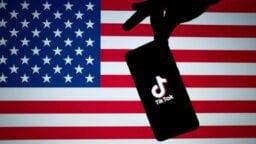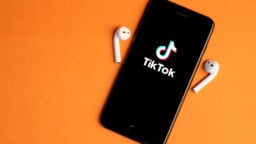On Wednesday (April 24), Joe Biden signed into law a bill that requires TikTok’s parent – China-headquartered tech giant ByteDance – to divest the app’s business in the US, or face a ban in the market, where it counts around 170 million users.
The law gives the company around 9 months to find a buyer, but the president does have the option to extend the deadline by three months if ByteDance can prove that a sale process is underway.
Reuters calculates that, following the signing of the bill into law, ByteDance has until January 19, 2025, to sell the app.
This development marks the latest attempt by lawmakers in the United States to ban the app, following the Trump administration’s executive orders issued back in 2020, which were ultimately revoked by Biden in 2021.
In a video posted to TikTok on Wednesday, the app’s CEO, Shou Zi Chew, vowed to fight the “unconstitutional” law in the courts, echoing a point that TikTok has been making since the law was first tabled in the House in March: that the law’s end goal is a full TikTok ban in the market.
“Make no mistake, this is a ban,” Chew said. “A ban on TikTok and a ban on you and your voice.”
Chew added: “Politicians may say otherwise, but don’t get confused. Many who sponsored the bill admit a TikTok ban is the ultimate goal.”
Citing sources, The Information reported on Thursday (April 25) that TikTok’s parent company “is internally exploring scenarios” to sell the app’s US business without its powerful recommendation algorithm.
TikTok’s algorithm is what powers its “For You feed” – which the company calls “a stream of videos curated to your interests”. According to TikTok, it “is one of the defining features” of the platform.
As reported by Reuters this afternoon, ByteDance denied The Information’s report via a statement published on media platform, Toutiao.
Later in the day on Thursday, Reuters reported that TikTok’s parent “would prefer” to shut the app down in the US if it’s unable to successfully challenge the legislation in the courts.
Citing its own sources, Reuters reported that the short-form video app’s US business “accounts for a small share of ByteDance’s total revenues and daily active users”.
They added that closing it down in the United States “would have limited impact” on the company’s global business and, furthermore, that, by shutting it down, rather than selling it to a US-based company, it “would not have to give up its core algorithm”.
Reuters‘ sources also said that TikTok shares “the same core algorithms” with other apps owned by ByteDance, such as China-based TikTok sister app Douyin.
TikTok’s algorithm and how it recommends content to TikTok’s users is one of the key concerns amongst lawmakers backing The Protecting Americans’ Data from Foreign Adversaries Act (H.R. 7520) and the Protecting Americans from Foreign Adversary Controlled Applications Act (H.R. 7521).
Some have expressed concerns that China’s Government could use the app to manipulate public opinion, including during elections. Lawmakers are also concerned that Beijing is able to access the app’s US users’ data.
On Tuesday (April 23) U.S. Senator Maria Cantwell (D-Wash.), Chair of the Senate Commerce Committee, and Senator Mark R. Warner (D-Va.), Chair of the Senate Intelligence Committee, laid out what they argued to be “the national security threats posed by ByteDance’s ownership of TikTok, including how its algorithm controls and manipulates information seen by US users”.
In an appearance before Congress last year, Shou Zi Chew, TikTok’s CEO, denied that TikTok shares US users’ data with the Chinese government and stressed the company’s plans to move its US data to servers operated by Oracle in Texas.
In a statement published by TikTok after Biden signed the bill into law: TikTok claimed that the law is “unconstitutional” and vowed to challenge it in court.
“We believe the facts and the law are clearly on our side, and we will ultimately prevail,” TikTok said in its statement. “The fact is, we have invested billions of dollars to keep U.S. data safe and our platform free from outside influence and manipulation.
“This ban would devastate seven million businesses and silence 170 million Americans. As we continue to challenge this unconstitutional ban, we will continue investing and innovating to ensure TikTok remains a space where Americans of all walks of life can safely come to share their experiences, find joy, and be inspired.”
Last year, the state of Montana passed a law banning app stores from offering TikTok in the state. That law was challenged by TikTok and a group of TikTok users on freedom of speech grounds, and was blocked by a federal judge this past December.Music Business Worldwide




